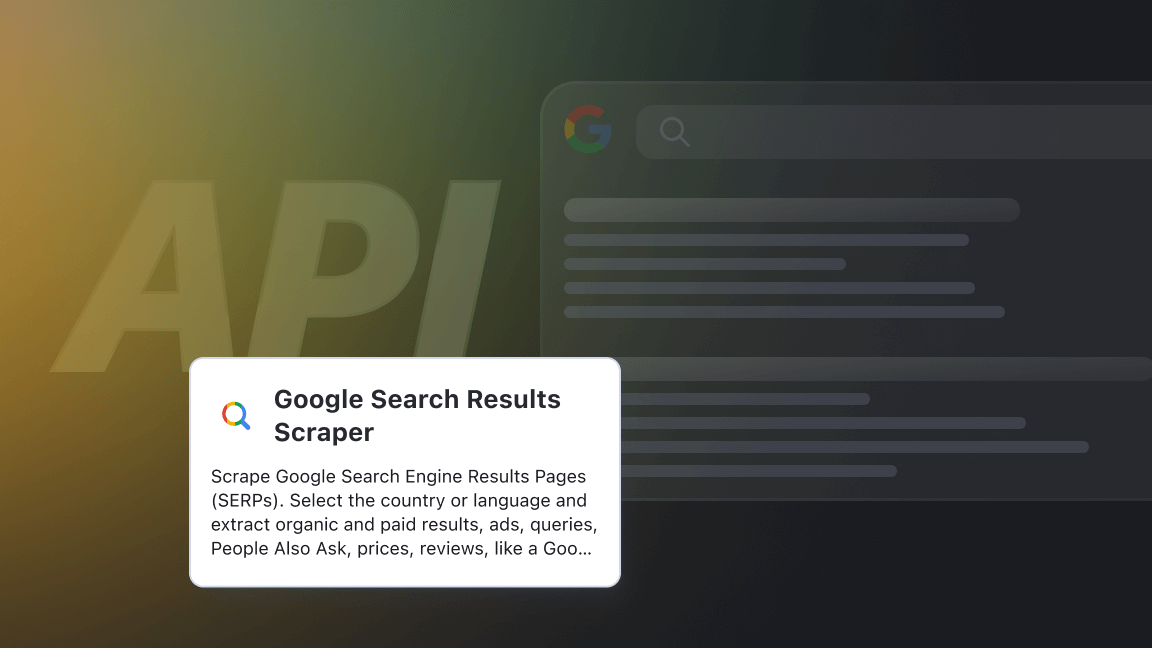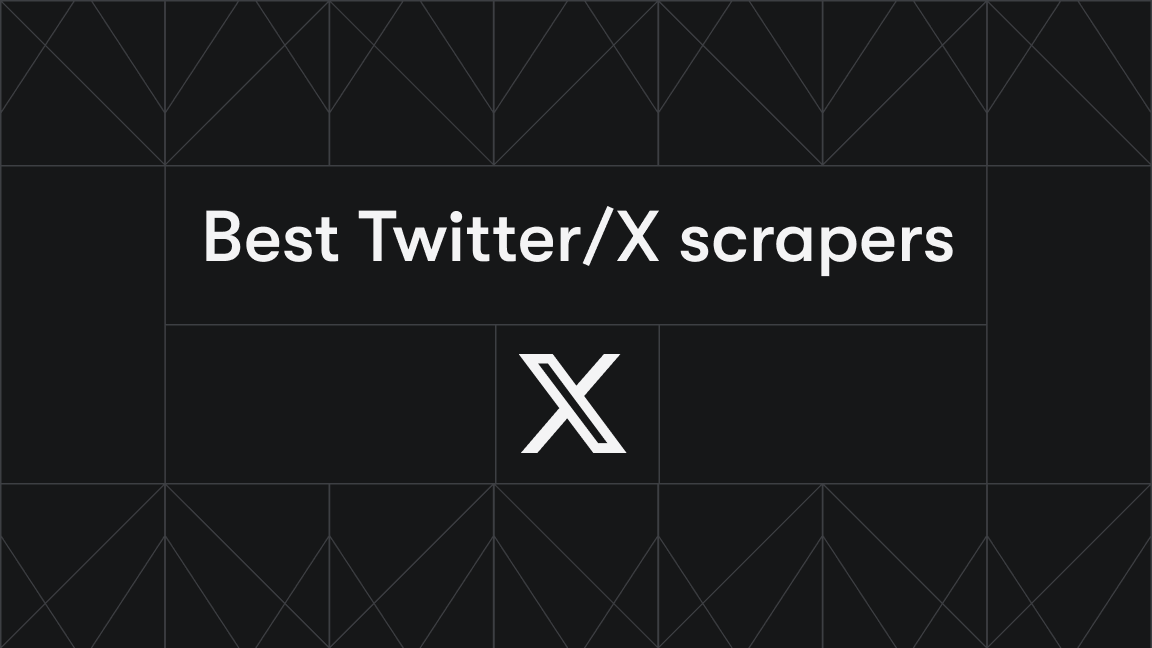Model Context Protocol (MCP) has made developers' lives easier by providing a standardized way to integrate external tools and data sources with AI agents. This integration makes AI assistants much more intelligent, enabling them to provide highly accurate and context-aware answers. Given these benefits, it’s no surprise that the MCP ecosystem is growing rapidly, with several new MCP servers being introduced monthly for marketing, SEO, productivity, software development, and more.
In this article, we’ll explore some of the best servers for developers that help automate repetitive tasks, improve development workflow, and increase productivity.
What are the best MCP servers for developers?
There are various types of MCP servers to help automate complex tasks, write better code, or enhance productivity. Let’s explore some of the best MCP servers for developers:
- Apify Actors MCP Server (web scraping and search capabilities)
- GitHub MCP server (GitHub workflow automation)
- Puppeteer MCP server (browser automation)
- Knowledge Graph Memory MCP server (persistent Memory for LLMs)
- Sequential Thinking MCP server (structured problem-solving)
- PostgreSQL MCP server (database access)
- MCP Compass (learning about MCP)
1. Apify Actors MCP Server - web scraping and search capabilities
Apify is a widely used platform designed for web scraping, data extraction, and browser automation. It has more than 5,000 cloud apps/OCI containers called Actors for tasks like scraping data from social media platforms, websites, and more.
With Actors MCP Server, you can integrate Apify tools with AI assistants. This gives AI assistants efficient web scraping capabilities. For example, the AI assistant can use Apify’s Facebook Posts Scraper Actor to scrape data from Facebook posts.
Similarly, you can ask the AI assistant to scrape travel data using the appropriate Apify Actor and use this data in your apps.
The server offers a streamable HTTP endpoint at https://mcp.apify.com, a legacy SSE endpoint at https://mcp.apify.com/sse, and local stdin/stdout connections started with npx -y @apify/actors-mcp-server.
You can interact with the server through clients like Claude Desktop, LibreChat, the VS Code MCP extension, and Apify's Tester MCP Client.
2. GitHub MCP server - GitHub workflow automation
Most developers today use GitHub for version control. With the GitHub MCP server, you can automate GitHub workflows to save time and enhance your development workflow. The server supports repository management, file operations, search functionality, and more.
You can integrate the GitHub MCP server with a Large Language Model (LLM) like Claude or code editors like VS Code and Cursor. They can then instruct the AI agent to perform actions like creating a new GitHub repository, creating or updating a file in a repository, pushing files in a commit, searching for GitHub repositories, creating a new issue, creating a pull request, forking a repository, and more. You can even ask the agent to extract data from GitHub repositories.
When integrated with a code editor like VS Code, the MCP server allows you to perform GitHub-related tasks directly from your editor. In VS Code, you can use the GitHub MCP server capabilities in Agent mode.
3. Puppeteer MCP server - browser automation
Puppeteer is a popular JavaScript library for browser automation and web scraping. You can integrate the Puppeteer MCP server with LLMs and ask them to perform browser automation tasks such as navigating to URLs, capturing screenshots, and filling out forms. The MCP server also enables AI assistants to access and interact with live web pages.
Additionally, through the Puppeteer MCP Server, LLMs can interact with a real browser environment, execute JavaScript code, and monitor console logs. LLMs can access console outputs and errors and analyze these logs, enabling them to efficiently identify issues and suggest fixes that actually work.
You can also integrate the MCP server with code editors like Cursor or VS Code and execute web automation tasks without leaving their coding environment.
4. Knowledge Graph Memory MCP server - persistent memory for LLMs
The Knowledge Graph Memory MCP server uses a local knowledge graph to provide LLMs and AI agents with persistent memory capabilities. It’s helpful for maintaining project context across chat sessions.
Basically, the server integration enables LLMs like Claude to remember information about the user and project across chats. AI assistants can recall past interactions, project details, and user preferences. This allows them to provide more personalized and context-aware responses, saving developers time and improving their productivity.
For instance, the AI assistant can maintain a history of code changes, errors, and fixes. Based on this history, the AI assistant can provide more accurate suggestions. Similarly, the AI assistant can adapt to your specific coding style and preferences by recalling past interactions and codebases.
5. Sequential Thinking MCP server - structured problem-solving
The Sequential Thinking MCP server enhances structured problem-solving. When integrated with an AI assistant, it enables the assistant to break down complex problems into manageable, sequential steps, where each step builds upon the previous one. This results in more organized and reflective reasoning processes.
For instance, a developer might ask Claude: “I need to refactor a monolithic application into a microservices architecture. Please use sequential thinking to outline the steps involved.” Claude will then use the Sequential Thinking MCP server to provide all the required steps, such as assessing the current monolithic structure, identifying components suitable for separation, and more.
6. PostgreSQL MCP server - database access
This MCP server enables LLMs like Claude to query PostgreSQL databases in a secure, structured way. The server supports read-only access to databases. LLMs can use the server to inspect database schemas and execute read-only queries.
You can also integrate the PostgreSQL MCP server into code editors like VS Code to explore database schemas and query the database directly from the editor.
7. MCP Compass - learning about MCP
While we have listed some of the best MCP servers for developers, every developer has different needs based on project requirements. Using MCP Compass, you can find the best MCP servers for your needs.
MCP Compass is itself an MCP server that you can integrate with an LLM like Claude. You can then ask the model to find the most appropriate servers for your specific needs, such as monitoring, browser automation, software testing, etc.
All in all, MCP Compass is a helpful tool for discovering the latest MCP servers and learning how to configure different MCP servers.
Conclusion
The MCP ecosystem has various helpful servers for developers, from the GitHub server that enables LLMs to create and fork repos and push files in a commit, to the PostgreSQL server that lets LLMs query databases.
For providing LLMs with access to current web data, Actors MCP Server stands out. This lets AI agents find, run, and fetch data from the right tool automatically, so they can operate independently, collecting live data, reacting to real-world changes, and completing tasks without manual prompts.
FAQs
What is Model Context Protocol (MCP)?
Model Context Protocol (MCP) standardizes how we connect AI agents to external tools, APIs, and data sources. This way, it eliminates the need for custom integrations and allows developers to create more intelligent AI assistants. By connecting to external tools and data sources, AI assistants can provide more accurate and context-aware responses. They can even perform tasks beyond text generation, such as accessing a database, making a payment, or even sending an email or message.
What are MCP servers?
MCP servers are essentially the protocol's actual implementation on the server side. They receive requests from the client or AI assistant and provide them as commands to appropriate tools or external systems. The server then formats and returns the results to the AI assistant, enabling it to access specific data and perform certain actions.
Learn more about MCP and AI agents
- The state of MCP - The latest developments in Model Context Protocol and solutions to key industry challenges.
- How to use MCP with Apify Actors - Learn how to expose over 5,000 Apify Actors to AI agents like Claude and LangGraph, and configure MCP clients and servers.
- How to build an AI agent - A complete step-by-step guide to creating, publishing, and monetizing AI agents on the Apify platform.
- What are AI agents? - The Apify platform is turning the potential of AI agents into practical solutions.
- LLM agents: all you need to know in 2025 - LLM agents are changing how we approach AI by enabling interaction with external sources and reasoning through complex tasks.
- 10 best AI agent frameworks - 5 paid platforms and 5 open-source options for building AI agents.
- Best low-code and no-code AI agent builders in 2025 - If frameworks like LangGraph or Haystack are too challenging for you, these AI agent builders might be what you're looking for.
- AI agent workflow - building an agent to query Apify datasets - Learn how to extract insights from datasets using simple natural language queries without deep SQL knowledge or external data exports.
- AI agent vs. chatbot - We break down the differences between agents and chatbots to help you decide which one to use for your business goals.
- AI agent orchestration with OpenAI Agents SDK - Learn to build an effective multiagent system with AI agent orchestration.
- 5 open-source AI agents on Apify that save you time - These AI agents are practical tools you can test and use today, or build on if you're creating your own automation.
- 6 AI agent tools that keep your agents grounded in current data - Apify Actors give agentic systems the ability to query the live web at production scale. Here are 6 you should try.
- AI agent architecture in 1,000 words - A comprehensive overview of AI agents' core components and architectural types.
- 11 AI agent use cases (on Apify) - 10 practical applications for AI agents, plus one meta-use case that hints at the future of agentic systems.
- 7 real-world AI agent examples in 2025 you need to know - From goal-based assistants to learning-driven systems, these agents are powering everything from self-driving cars to advanced web automation.
- 7 types of AI agents you should know about - What defines an AI agent? We go through the agent spectrum, from simple reflexive systems to adaptive multi-agent networks.








